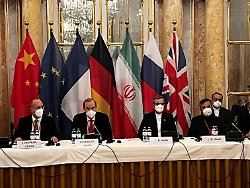Saturday, December 4th 2021
Difficult nuclear negotiations
EU and US deeply disappointed in Iran
After the change of government in Iran, Europe and the USA want to revive the international nuclear agreement, from which the then US President Trump withdrew in 2018. But the first negotiations are anything but promising.
From the point of view of the USA and the European negotiators, the nuclear negotiations with Iran in Vienna are not going well. Germany, France and Great Britain had expressed their “disappointment and concern” with the Iranian side about their demands, it said on Friday from diplomatic circles. The US accused Tehran of failing to present “constructive proposals”. The state Iranian news agency Irna reported that talks are to be suspended until at least Monday.
“Tehran is moving away from almost all compromises,” which were “hard to find” during the first round of negotiations between April and June, declared diplomats from Germany, France and Great Britain. The talks should therefore “be resumed next week to see whether these differences can be overcome or not”.
The US also expressed criticism of the Iranians’ attitude. “The new Iranian government did not come to Vienna with constructive proposals,” said Foreign Office spokeswoman Jen Psaki. There had been “progress” in the first rounds of negotiations up to June, but this week Tehran “unfortunately did not try to resolve the remaining issues”.
The Iranian government presented two texts on Thursday with proposals for a revival of the international nuclear agreement. They refer to the lifting of the sanctions imposed on Iran and Tehran’s nuclear obligations, said chief negotiator Ali Bagheri.
Iran is expanding uranium enrichment capacities
On Monday, nuclear negotiations with Iran were resumed after a five-month hiatus. Tehran initially put the talks on hold when the ultra-conservative clergyman Ebrahim Raisi was elected president in June. The 2015 agreement is designed to prevent Tehran from building nuclear weapons. Among other things, the country undertook to limit its uranium enrichment capacities and to allow regular inspections of its nuclear facilities. In return, international sanctions were lifted.
In 2018, under President Donald Trump, the United States withdrew from the agreement and again imposed massive sanctions on Iran. Thereafter, Tehran also gradually withdrew from the agreement. Since then, Iran has continued to expand its uranium enrichment capacities and at the same time restricted the international atomic authority’s control options.
“Everyone knows that they have resumed work on enrichment,” said French President Emmanuel Macron during a visit to Dubai. “So we have a situation that is not good for them and also not good for regional security.” It is therefore “not to be ruled out” that this round of negotiations “will not reopen soon”.
The USA only participates indirectly in the Vienna talks, even if President Joe Biden has basically signaled readiness for a new version of the agreement with Iran. Foreign Minister Antony Blinken had recently expressed himself not very confidently about the prospects of success of the negotiations. “Our governments are still determined to find a diplomatic path,” declared the diplomats from Germany, France and Great Britain. “But time is running out.”
